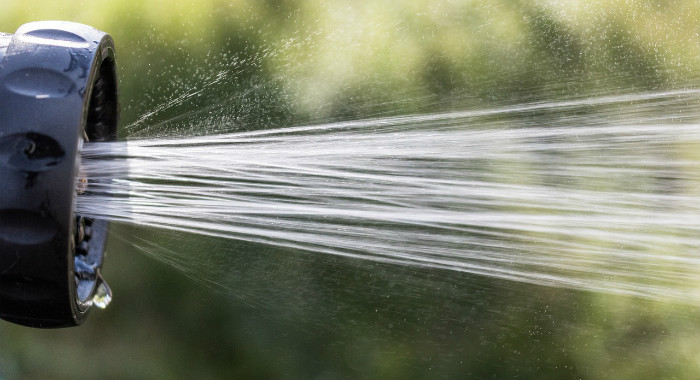Keeping your lawn well watered and looking pristine can be difficult during hot and dry periods. Using a sprinkler system is the easiest way to achieve this.
One of the most popular watering systems are underground sprinklers, as they are invisible and won’t spoil your view of your garden.
But, with costs of underground irrigation systems reaching the thousands, it’s out of reach for many people. The installation under an existing lawn can also be disruptive.
So what can you do? We will tell you all about the alternatives to underground sprinkler systems you need to know.
4 Alternatives To Underground Sprinkler Systems On A Budget

While you could consider building your own underground irrigation system to keep the costs down, most of us don’t feel confident enough for such a DIY project.
It would also mean that you would miss out on some of the important features of a purpose-built one. Like having a timer that will allow you to just forget about it.
Here are ways to keep your garden watered without the high costs and faff.
1. Water By Hand
Grab a hosepipe or watering can and give the garden a good water by hand.
It’s the old-school method, but that doesn’t mean it’s not effective. After all, that’s how people have done it for hundreds of years and many still do it this way today.
Let’s look at the pros and cons of this vintage method:
Benefits
- Cheap – all you need is a watering can or hosepipe and water
- Effective – doing it this way you can ensure that every part of your garden is watered
- Better for the environment – you don’t need to disturb the soil or use electricity
- Save water – any type of sprinkler system will use more water than if you do it by hand
- Use rain water – if you have water buds, you can use the collected rain water, making it even cheaper and better for the environment
Drawbacks
- Time-consuming – depending on the size of your garden, it could take a lot of time
- Effort – especially if you use a watering can, this method can be quite a lot of work carrying the can to and from the tap
It’s the method that we use, mostly because it’s cheap and better for our planet. We also find that carrying a full watering can is quite a good workout.
And because it does take some time, it forces us to consider if everything needs to be watered. This helps us to save water and keeps the costs to a minimum. I also find it quite nice to spend some time in our garden every evening during summer to close the day.
Of course, if time is a rare commodity for you, this method might just not work. Especially if you have a large garden.
- Leak-Resistant Brass Fittings: Built with solid 2cm brass fittings, this expandable garden hose resists leaks and withstands high pressure up to 12 BARS for worry-free watering in any season
- Retractable and Lightweight Design: The retractable hose expands to 3x its original length and shrinks back for easy storage; enjoy full flexibility and lightweight control while watering
- Durable Double-Layer Construction: Featuring a tough outer fabric and double latex core, this heavy duty water hose handles temperatures up to 45°C without kinking, cracking, or bursting
2. Use Manual Sprinklers
If watering by hand just isn’t for you, you might want to consider a manual sprinkler system.
It’s the preferred option for most homeowners who want to regularly water their garden or lawn, but without spending much time on it. So let’s look at the pros and cons:
Benefits
- Cost-effective – a simple manual sprinkler system can cost as little as £10
- Time-saving – all you have to do is switch on the water
- Easy to install – there is no digging, just place the sprinkler where you need them and connect them
- Great choice – there are different types to suit any type of garden
- Extra functions – some, more expensive, come with functions like a timer
Drawbacks
- You have to remember to switch it on – unless you have one with a timer, it’s on you to switch the water on
- Missed patches – not everything might get watered, unless you move the sprinklers around
- Uses more water – sprinklers use more water than watering by hand
- Over-watering – if you forget to switch it off, you will over water your garden
- Maintenance –
It’s no wonder that this is the most popular watering system. It’s cheap but also makes watering an easy job. If you can afford a manual sprinkler with a timer and ensure full coverage, it’s probably the closest you can get to the functionality of an underground sprinkler system.
- PREMIUM QUALITY MATERIAL: High-quality ABS plastic, ensure sturdy and constant use. Internal thread allows sealing tightly and securely.
- EASY TO USE: Simply connect water joint to the connector and faucet. ( NOT INCLUDING JOINT ) When you turn on the tap, garden sprinkler will start spraying.
- 3 NOZZLES & 360°ROTATING: Each jet has three different angles of the outlet and each exit aore uniform irrigation range, cover a wide irrigation area.
3. Install A Drip Irrigation System
Although not suitable for watering large lawns, a drip irrigation system can be very effective in garden borders, veggie patches and even in greenhouses or polytunnels.
They are essentially a hosepipe with connectors spaced at intervals that can be controlled to release water one drip at a time.
This gives the plan a steady stream of water throughout the day which can often be better for plants and reduces or even removes the need for you to manually water!
Benefits
- Cost-effective – from £20 you can get a simple drip irrigation system
- Keeps soil moist – this is better for plants than the soil drying out and then getting drenched
- Time-saving – no need to water your plants by hand at all
- Easy set up – it’s not at all complicated to install
- Saves water – uses less water than other watering systems
- Less water pressure – because it doesn’t need much water pressure, it saves on energy
- Keeps foliage dry – this can prevent diseases
Drawbacks
- Expensive – more sophisticated systems can be expensive and difficult to install
- Maintenance – the hose pipes need cleaning regularly to prevent clogging up
- Leaks – these can be difficult to detect which means you might waste water for a long time
- Access to electricity – more complex systems will need access to a power source
We have a drip irrigation system for our polytunnel, which works great. Especially in summer, when temperatures are high, this saves us a lot of time watering our veggies.
4. Don’t Water At All
Of course, another option is just to forego watering at all. If you have plants that require regular watering then this may not be an option during extended dry periods.
However, if it’s just your lawn you are worried about, you may not need to be too concerned.
Most grass will go dormant when experiencing extended dry conditions. This is why grass goes yellow or brown. It’s not necessarily dying, it can survive in a dormant state for several weeks without water.
Therefore, don’t feel you need to water your lawn the moment it loses its vivid green colour, the chances are, the colour will return on the next significant downpour.
Benefits
- Cheap – not watering will save you a lot of money
- Eco-friendly – saving water is also better for our environment
- Time-saving – not watering could save you a lot of time, especially with a large lawn
- Less work – one chore less for a busy gardener
Drawbacks
- Brown lawn – some people might not like the sight of this
- Not suitable for borders or veggie patches – while grass will grow back, flowers and veggies won’t
We use this method for our wild area and the wildflower meadow, as it’s the natural way. And these areas don’t get very brown, because being longer than a typical lawn, they retain moisture much better.
Top Tip: If you consider this option, refrain from cutting your lawn during dry hot periods, as this will kill the grass faster.
Generally speaking, the shorter the lawn, the more water it needs. That’s because short grass can only grow short roots. During dry periods, the soil nearer to the ground dries out. Only longer roots will be able to access water deeper down.
So why not skip mowing your lawn more often and if you do cut your grass, don’t cut it too short.
Choose The Watering Method That Suits You
When it comes to watering your garden, you have several alternatives to underground sprinkler systems. Which one you choose will depend on your needs and budget.
Considering the pros and cons of each method will help you to find the one that works best for you. No matter what your budget, there are ways to keep your garden well watered.
If you have enjoyed this article, you may also like our guide on cheap ways to make a garden look nicer.







